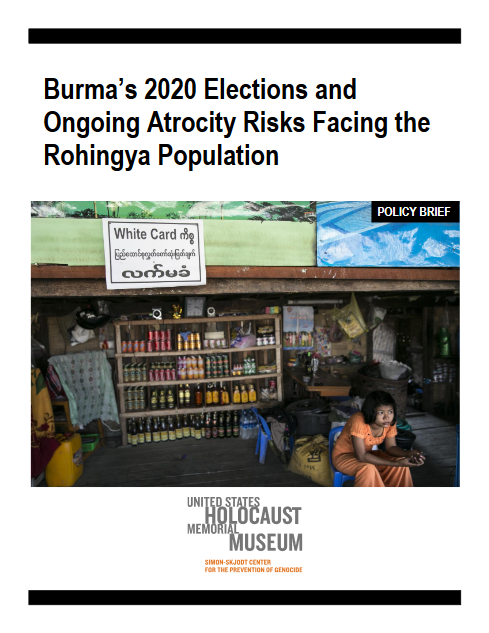Burma’s 2020 Elections and Ongoing Atrocity Risks Facing the Rohingya Population


Introduction
Burma’s 2020 national elections, scheduled for November 8th, will take place in a fragile context of ongoing risk of genocide for the country’s minority Rohingya population and continuing mass atrocities—including war crimes and crimes against humanity—against other ethnic populations. While the elections themselves may not be a trigger for mass atrocities in Burma, the responses to the elections from within the country and internationally has the ability to either exacerbate or mitigate future atrocity related risks.
Parliamentary seats at the national and state level will be voted upon in the November elections. Only 75% of the total seats will be contested, as the country’s constitution reserves 25% of seats for the military. At the time of writing, it appears as though most Rohingya within Burma—members of an ethnic and religious minority that has been the victims of genocide—will be denied the right to vote. The approximately one million Rohingya who now live as refugees in Bangladesh will likewise be unable to vote in the elections. At least six Rohingya candidates have been prevented from running for office by the Union Election Commission (UEC), despite some of them having been approved candidates in the past and, in one case, having won a parliamentary seat. These candidates were blocked from running because they were unable to confirm the citizenship of their parents at the time of their birth. The UEC
has applied such policies in a discriminatory fashion against Rohingya politicians, raising concerns that key Rohingya politicians will be unable to contest seats in the elections.
This is not the first time the government has denied these rights, and the continued disenfranchisement and exclusion of Rohingya heightens their vulnerability to future atrocities. An election in which a people, who have been the victims of genocide, are denied the right to vote on the basis of their identity, is not a free, fair, or inclusive election. Any foreign government’s praise and support of Burma’s elections would be seen as endorsing a discriminatory process and lending support to the policies and behaviors that contributed to the genocide of the Rohingya and to ongoing risk. Instead, leaders around the world should use their available levers to mitigate atrocity risks, press for inclusivity regarding voting and political participation, and encourage other changes within Burma that advance the protection of the Rohingya and other vulnerable groups.

